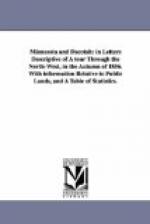Now, the rights of an agricultural preemptor we understand. He is entitled, if he shall “make a settlement in person on the public lands,” and “shall inhabit and improve the same, and shall erect a dwelling thereon,” to enter, “by legal subdivisions, any number of acres not exceeding one hundred and sixty, or a quarter-section of land, to include the residence of such claimant.” (Act of 1841, s. 10.) And of two settlers on “the same quarter-section of land,” the earlier one is to have the preference. (Sec. 11.)
Now, was it ever imagined that such claimant must personally inhabit every quarter quarter-section of his claim? That he must have under cultivation every quarter quarter-section? That he must erect a dwelling on every quarter quarter-section? And that, if he failed to do this, any such quarter of his quarter-section might be preempted by a later occupant?
There is no pretension that such is the condition of the ordinary preemptor, and that he is thus held to inhabit, to cultivate, to dwell on, every quarter quarter-section, under penalty of having it seized by another preemptor, or entered in course by any public or private purchaser. He is to provide, according to the regulations of the Land Office or otherwise, indicia, by which the limits of his claim shall be known,— he must perform acts of possession or intended ownership on the land, as notice to others; and that suffices to secure his rights under the statute. It is not necessary for him to cultivate every separate quarter of his quarter-section; it is not necessary for him even to enclose each; it only needs that in good faith he take possession, with intention of occupation and settlement, and proceed in good faith to occupy and settle, in such time and in such manner, as belong to the nature of agricultural occupation and settlement.
Why should there be a different rule in regard to occupants for municipal preemption? The latter is, by the very tenor of the law, the preferred object. Why should those interested in it be subject to special disabilities of competing occupancy? I cannot conceive.




